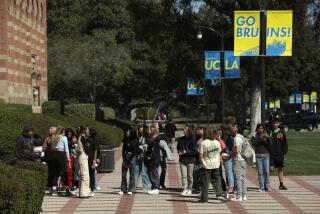Israeli Travel Dispute Cancels Secret Meeting
- Share via
Officials of the San Diego State University Foundation, reacting to Israel’s refusal to grant two Palestinian leaders travel permits to the United States, Wednesday canceled a secret meeting of Israeli and Egyptian legislators who were to convene in San Diego to discuss Israel’s occupation of Arab territories.
Robert Ontell, executive director of the foundation’s Fred J. Hansen Institute for World Peace, blamed “policy conflicts” in the government for the Israel Defense Ministry’s refusal to approve travel permits for deposed Hebron Mayor Mustafa Natashe and Gaza attorney Faiz Abu-Rahma to attend the meeting.
A ministry spokesman said Saturday in Tel Aviv that Israeli officials feared that both men would meet with “hostile elements” while in San Diego. He did not elaborate. Travel permits were given to other Palestinian leaders but they refused to attend the meeting unless Natashe and Abu-Rahma were also allowed to attend.
Residents of the occupied West Bank and the Gaza Strip who want to travel abroad must obtain permission from Israeli military authorities.
Ontell, who worked for almost eight months to arrange the meeting, said that Natashe, Abu-Rahma and “other moderate” Palestinians had agreed to meet with seven Israeli Parliament members and intellectuals and three Egyptian Parliament members to discuss solutions to the Israeli-Palestinian conflict. The meeting was to include a team of U.S. observers that included Samuel Lewis, former U.S. ambassador to Israel, and former Assistant Secretary of State Harold Saunders.
Saunders served for eight years as ambassador to Israel and worked on the Camp David peace accord signed by Israel and Egypt in 1979. He was also an assistant to former Secretary of State Henry Kissinger and played a role in the shuttle diplomacy between Israel and the Arab nations.
The five-day symposium, which was to begin next week at Vacation Village, a Mission Bay hotel-resort, will be rescheduled for later this year, Ontell said.
The canceled meeting was one of three similar gatherings between Egyptians and Israelis that have been quietly arranged in San Diego by the foundation since 1981. According to Ontell, the meetings have been encouraged and funded partly by the State Department as a way to find a peaceful solution to the problem of establishing a Palestinian homeland. The foundation has been working on Middle East issues since 1979, he added.
In 1981, the foundation received $4 million from the State Department’s Agency for International Development to provide funding for research for Israeli and Egyptian marine biologists at the Scripps Institution of Oceanography. In 1982, the foundation received $9 million in State Department funds for a scientific and agriculture exchange between scientists from both nations, Ontell said.
State Department officials could not be reached for comment Wednesday.
Ontell said that the meetings have been held in secret for security reasons and in order not to embarrass Egypt, which was ostracized by much of the Arab world after signing the peace treaty with Israel.
“We didn’t want to fan extremists on both sides,” Ontell said. “We were convinced that we could play a quiet, constructive role by not telling the press what we were doing. It would’ve been too embarrassing to the parties involved.
“Egypt is trying to restore relations with the rest of the Arab world. They (Egyptians) requested, and the Israelis agreed, to meet without any fanfare.”
He declined to identify the three Egyptian Parliament members who had agreed to attend the meeting. But he identified the Israeli delegation as Knesset members Ora Namir and David Libair, members of the Labor Party. The others included Eleazer Granot, chairman of the Matam Party and a Knesset member; Haim Zadok, former justice minister and a Labor Party member; Shulamit Aloni, a Knesset member for the Citizens Rights Party; Amos Elon, a writer, and Shimon Shamir, a professor of Islamic studies at Tel Aviv University.
More to Read
Sign up for Essential California
The most important California stories and recommendations in your inbox every morning.
You may occasionally receive promotional content from the Los Angeles Times.










